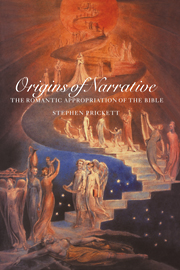Book contents
- Frontmatter
- Contents
- Preface
- Acknowledgements
- Introduction
- PART I JACOB'S BLESSING
- PART II THE ROMANTIC BIBLE
- 3 The Bible as novel
- 4 The Bible and history: appropriating the Revolution
- 5 The Bible as metatype: Jacob's ladder
- 6 Hermeneutic and narrative: the story of self-consciousness
- Epilogue
- Bibliography
- Index
4 - The Bible and history: appropriating the Revolution
Published online by Cambridge University Press: 06 November 2009
- Frontmatter
- Contents
- Preface
- Acknowledgements
- Introduction
- PART I JACOB'S BLESSING
- PART II THE ROMANTIC BIBLE
- 3 The Bible as novel
- 4 The Bible and history: appropriating the Revolution
- 5 The Bible as metatype: Jacob's ladder
- 6 Hermeneutic and narrative: the story of self-consciousness
- Epilogue
- Bibliography
- Index
Summary
ROMANTICISM AND REVOLUTION
As Jane Austen had suspected, at the heart of romantic liberation there lurked a devastating sense of loss – the more poignant for being so often unconscious and inarticulate. Henry Crawford's own inner emptiness, which helps to explain his attraction to Fanny, also makes him an ideal candidate for romanticism. Its whole mood has been characterised by a ‘sense of longing’ for something lost or for ever unattainable or incomplete. In the major poets, this sense of loss – at once personal and cultural – could become a mainspring of their art. For Wordsworth in the Immortality Ode, and no less in the autobiographical Prelude, it takes the form of a controlled nostalgia for a state of childhood ecstasy that cannot quite be recalled or recreated, but remains liminal, as it were, just beyond the threshold of consciousness. Similarly Coleridge's Ancient Mariner is haunted by the idea of a state of innocence that is unrecoverable – and the more desirable for its very impossibility. Keats’ Odes betray something of the same nostalgia for a state of health as much psychological as physical. Even Byron's sturdy mockery of such effete sensibilities has at times more than a hint of whistling in the dark. Perhaps most startling of all, however, is Blake's discovery that in order to recapture the prophetic sense of meaning in current events that he believed was available to both biblical and classical worlds, he has to invent a completely new mythology of history.
- Type
- Chapter
- Information
- Origins of NarrativeThe Romantic Appropriation of the Bible, pp. 152 - 179Publisher: Cambridge University PressPrint publication year: 1996



